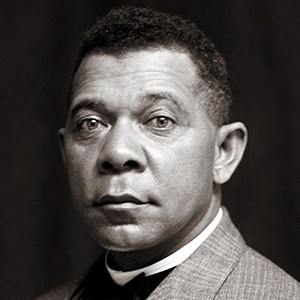Booker T. Washington was born a slave and became one of the most influential African American leaders of his time. He founded the Tuskegee Institute, a black school for teachers, as well as the National Negro Business League. Washington was well-respected outside of the black community, he also advised Presidents Theodore Roosevelt and William Taft.
Early Life
Washington was born into slavery 1856 and was nine-years-old when the Civil War ended. Once freed, he worked to put himself through school and graduated from Hampton Normal Agricultural Institute in Virginia. In 1881, he founded the Tuskegee Normal and Industrial Institute in Alabama (now known as Tuskegee University), which became one of his greatest accomplishments.
Fight for Civil Rights
Washington believed that the African American community should attain economic self-reliance through education and training, and then work towards securing civil rights.
He also embraced the policy of accommodation, under which African Americans should accept disenfranchisement and segregation as long as whites guaranteed them economic progress, educational opportunity, and due process in the courts.
The Atlanta Compromise
In 1895, Washington made what is commonly known today as the Atlanta Compromise speech before the Cotton States and International Exposition in Atlanta. In his speech, Washington addressed both blacks and white. He encouraged African Americans to “[cast down their buckets] in agriculture, mechanics, in commerce, in domestic service, and in the professions.” Yet he also appeased the white audience by stating: “In all things that are purely social we can be as separate as the fingers, yet one as the hand in all things essential to mutual progress.”
Presidential Advisor
In 1901, Washington became the first African American to visit the White House as a guest of President Theodore Roosevelt. He also advised President William Taft on racial issues. Due to his conciliatory approach, Booker had many white benefactors, but often clashed with black political activists like W.E.B. Du Bois who called for an end to segregation.
Washington was also a shrewd politician. He learned how to fundraise, control the media, reward his allies, shut down critics, and frame his views so as not to alienate his white supporters. In the background, he secretly funded lawsuits and other efforts challenging segregation.








